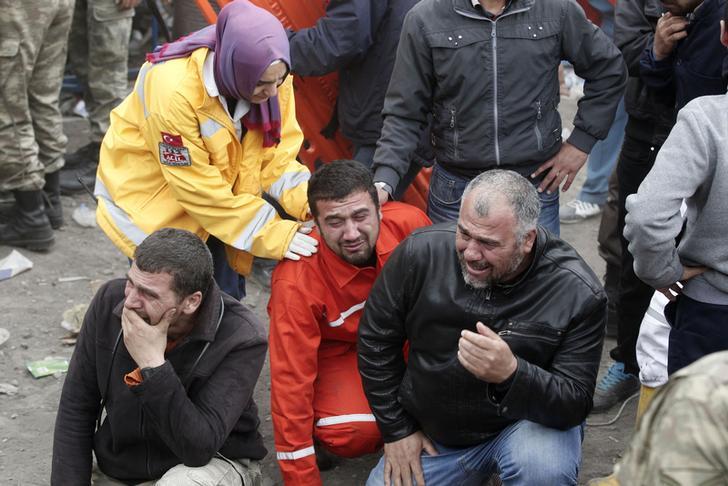Turkey mourns for its miners and many blame the government for not enforcing safety standards
Relatives of miners who were killed or injured in a mine explosion react as rescuers work in Soma, a district in Turkey’s western province of Manisa May 14, 2014.
Mines are dangerous places to work, anywhere. But the scale of this week's accident at a coal mine in Soma, Turkey is unusual. And there were known safety problems, according to a Turkish legislator.
"This is by far the worst mine accident in the history of modern Turkey," says Faruk Logoglu, a former ambassador to the US and an opposition member of parliament. "The number of lives lost is just too much to absorb."
Nearly 300 miners have been confirmed dead already — and more remain unaccounted for. At this point, there's little hope of finding any other survivors.
The scale of the disaster has sparked tens of thousands of people to protest all over Turkey. Some blame Prime Minister Recep Tayyip Erdogan for not enforcing safety standards in Turkish mines.
Logoglu says his party had been calling for increased mine safety since long before the accident in Soma and had introduced a motion in parliament.
The debate on that motion took place only a few weeks ago, and the motion failed. It sought to push the government to investigate the safety of mines in the district of Soma. "And the reason for this motion was that safety standards were not up to par, and that a lot of accidents were occurring, including fatalities," he says.
Logoglu points to two possible reasons why safety regulations are not enforced in Turkey, even though the rules exist on paper. One, he says, is the recent privatization of mines in Turkey. "The private sector is perhaps a little more difficult to bring in line with the standards we should observe," he says.
The second reason, he says, is that labor unions are not strong enough to put pressure on the government and mine owners to ensure safety.
Logoglu says he is not surprised the ruling party of Recep Tayyip Erdogan failed to pass the motion. "Every time the opposition presents a motion, the ruling majority almost automatically rejects any demand for parliamentary investigation," he says.
Logoglu says his party does not want to use this tragedy for political ends. "This is certainly the perception we are very diligently trying to stay away from. This is a moment of national mourning and we sympathize with the families."
At the same time, the legislator feels it's a time for action. "We believe that people are entitled to express their frustration and if they are blaming the government, [it] should respond to that," he says.
Mines are dangerous places to work, anywhere. But the scale of this week's accident at a coal mine in Soma, Turkey is unusual. And there were known safety problems, according to a Turkish legislator.
"This is by far the worst mine accident in the history of modern Turkey," says Faruk Logoglu, a former ambassador to the US and an opposition member of parliament. "The number of lives lost is just too much to absorb."
Nearly 300 miners have been confirmed dead already — and more remain unaccounted for. At this point, there's little hope of finding any other survivors.
The scale of the disaster has sparked tens of thousands of people to protest all over Turkey. Some blame Prime Minister Recep Tayyip Erdogan for not enforcing safety standards in Turkish mines.
Logoglu says his party had been calling for increased mine safety since long before the accident in Soma and had introduced a motion in parliament.
The debate on that motion took place only a few weeks ago, and the motion failed. It sought to push the government to investigate the safety of mines in the district of Soma. "And the reason for this motion was that safety standards were not up to par, and that a lot of accidents were occurring, including fatalities," he says.
Logoglu points to two possible reasons why safety regulations are not enforced in Turkey, even though the rules exist on paper. One, he says, is the recent privatization of mines in Turkey. "The private sector is perhaps a little more difficult to bring in line with the standards we should observe," he says.
The second reason, he says, is that labor unions are not strong enough to put pressure on the government and mine owners to ensure safety.
Logoglu says he is not surprised the ruling party of Recep Tayyip Erdogan failed to pass the motion. "Every time the opposition presents a motion, the ruling majority almost automatically rejects any demand for parliamentary investigation," he says.
Logoglu says his party does not want to use this tragedy for political ends. "This is certainly the perception we are very diligently trying to stay away from. This is a moment of national mourning and we sympathize with the families."
At the same time, the legislator feels it's a time for action. "We believe that people are entitled to express their frustration and if they are blaming the government, [it] should respond to that," he says.
Our coverage reaches millions each week, but only a small fraction of listeners contribute to sustain our program. We still need 224 more people to donate $100 or $10/monthly to unlock our $67,000 match. Will you help us get there today?
